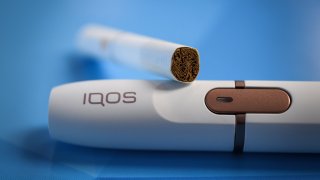
- Altria and Philip Morris International are no longer able to sell or import Iqos tobacco devices in the U.S. after the Biden administration opted to take no action on an ongoing patent dispute.
- A separate claim filed with the U.S. Patent and Trademark Office could restore the devices back on the market in six to 12 months.
- Iqos doesn't represent a large portion of Altria's U.S. business, but it's part of the company's shift away from traditional tobacco products.
Altria and Philip Morris International are no longer able to sell or import Iqos tobacco devices in the U.S. after the Biden administration opted to take no action on an ongoing patent dispute.
Rival R.J. Reynolds, a subsidiary of British American Tobacco, had filed a claim with the U.S. International Trade Commission. In late September, the ITC ruled that the Iqos device infringed on two of Reynolds' patents. As part of the process, the Biden administration conducted a 60-day administrative review and decided to not take any action to reverse the ITC's decision.
"Today's announcement provides a measure of success for our enforcement of IP rights to ensure we can continue to innovate, as is common practice among innovation-based industries," British American Tobacco Assistant General Counsel Gareth Cooper said in a statement.
Get South Florida local news, weather forecasts and entertainment stories to your inbox. Sign up for NBC South Florida newsletters.
Altria launched the Iqos device in the United States two years ago, but it began development of the product more than a decade ago before Philip Morris was spun off from the company. The device heats tobacco without burning it, which is meant to give users the same rush of nicotine without as many toxins as smoking a cigarette.
Philip Morris sells the device in dozens of international markets and has granted Altria a license to sell it in the U.S. While Iqos doesn't represent a large portion of Altria's U.S. business, it's part of the company's shift away from traditional tobacco products, which have seen falling demand. Altria said it counts 20,000 U.S. consumers as users of the device, but they will no longer be able to purchase it in the U.S. The company is offering refunds to existing users.
This isn't the end of the patent dispute between Reynolds, Altria and Philip Morris. Reynolds also filed two claims with the U.S. Patent and Trademark Office over Iqos. Early rulings are expected in 2022, although decisions can be appealed, which could drag the process out even longer. Stifel analyst Christopher Growe wrote in a note to clients that he believes the ultimate patent challenge in the U.S. will be successful for Iqos.
Money Report
Philip Morris said that its contingency plans to return to the U.S. are underway. The two companies could move production to the U.S. or change up the design enough to avoid patent infringement claims.
"While this decision will cause near-term disruption, we continue to see a large opportunity for IQOS and other FDA authorized smoke-free products in the U.S. over the coming years," Philip Morris said in a statement.
Shares of British American Tobacco were down 1% in premarket trading on Tuesday, while the stocks of Altria and Philip Morris had both fallen less than 1%.






